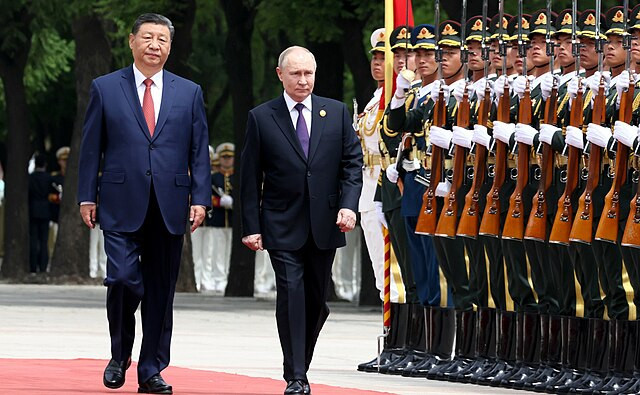Russian President Vladimir Putin and Chinese leader Xi Jinping pledged to deepen their "no-limits" partnership during a Beijing summit on Thursday, as both countries face growing tensions with the United States and its allies. The largely symbolic visit, which coincided with Russia's new offensive in northeast Ukraine's Kharkiv region, underscored the strengthening ties between Moscow and Beijing in the face of Western pressure.
During their meeting, Putin thanked Xi for his efforts to resolve the war in Ukraine, while both leaders stressed the importance of their countries' relationship. "Both sides want to show that despite what is happening globally, despite the pressure that both sides are facing from the U.S., both sides are not about to turn their backs on each other anytime soon," said Hoo Tiang Boon, a professor who studies Chinese foreign policy at Singapore's Nanyang Technological University.
Although both leaders expressed a desire for peace in Ukraine, they offered no new specifics in their public remarks. China has maintained a neutral position in the conflict while backing Moscow's claims that Russia was provoked into attacking Ukraine by the West. Beijing also continues to supply Russia with key components needed for weapons production.
China's broadly worded peace plan, proposed in 2023, was rejected by both Ukraine and the West for failing to call for Russia to withdraw from occupied Ukrainian territory. Ukrainian President Volodymyr Zelenskyy has stated that any negotiations must include a restoration of Ukraine's territorial integrity, the withdrawal of Russian troops, the release of all prisoners, a tribunal for those responsible for the aggression, and security guarantees for Ukraine.
The two leaders signed a joint statement on deepening the comprehensive strategic partnership between their nations, marking the 75th anniversary of diplomatic ties. Xi emphasized that China and Russia would continue to uphold a position of non-alliance and non-confrontation, while also considering the negative impact of U.S. and NATO strategy in the Asia-Pacific region.
Since the imposition of Western sanctions, Russia has become increasingly economically dependent on China, with Moscow diverting the bulk of its energy exports to Beijing and relying on Chinese companies for imports of high-tech components for its military industries. Military ties between the two countries have also strengthened in recent years, with joint war games and the sharing of sensitive military technologies.
The meeting between Putin and Xi served as a reminder of the growing partnership between the two U.S. rivals, as well as the challenges faced by the West in addressing the ongoing conflict in Ukraine and the potential for further escalation. As Russia continues its offensive and China maintains its support, the international community will closely monitor the evolving dynamics between these two major global powers and their impact on regional stability and global security.
The summit also highlighted the delicate balance China must strike in its relationship with Russia, as it seeks to maintain its economic ties with the West while offering diplomatic support to Moscow. As pressure mounts from the United States and Europe for China to play a more active role in ending the war in Ukraine, Xi will need to carefully navigate his country's interests and avoid alienating key trading partners.






